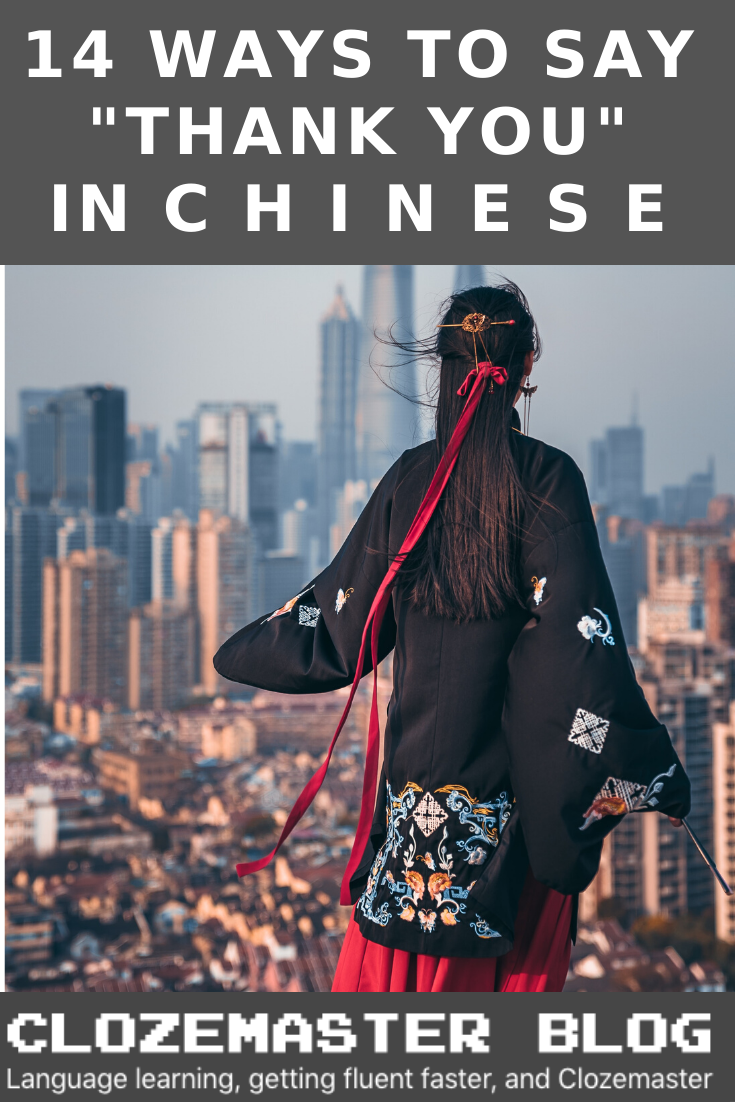
Chinese culture is one of gratitude, honour, and formalities. When speaking Chinese, it is very important to be polite in a culturally appropriate way. For this reason, you’ve got to know how to say “thank you” in Chinese, not just in the most basic sense, but with the best responses to various situations.
While you are learning all the ways to say “thank you” in Chinese, keep in mind that in Chinese culture, actions speak louder than words, so if you are truly grateful, make it up to them by returning the favor when you can.
How to say “thank you” in Chinese when someone did you a favor
谢谢 (xiè.xiè) | thank you
This is the most basic and standard way to say “thank you” in Chinese which you’ve probably heard of before. 谢谢 can be used in most situations where you want to express gratitude and appreciate someone’s help.
谢谢你 (xiè.xiè nǐ) | thank you
This is exactly the same as 谢谢 but with a bit more emphasis on the person you are thanking. You can also say 谢谢你们 (xiè.xiè nǐ.mén) if you are addressing multiple people, or 谢谢您 (xiè.xiè nín) if you are in a more formal setting.
谢谢大家 (xiè.xiè dá.jiā) | thank you all
This is what you would say if you were addressing a sizeable group of people such as an audience. It is common to hear this after presentations or speeches.
How to say “thank you” in casual Chinese
谢了(xiè.le) | thanks
This is a quick, super informal way to express thanks between friends. This is often used in txt language where short words and phrases are favored.
多谢 (duō.xiè) | thanks heaps
多 literally means “many”, so 多谢 is a quick and casual way to say “many thanks”.
How to say “I’m grateful” in Chinese – an alternative to “thank you”
If you want to add some variety to your vocabulary and use something different to the standard 谢谢, another way to say thank you in Chinese is by saying the equivalent of “I’m grateful”.
感恩 (gǎn.ēn) | grateful
Literally meaning grateful or owing, 感恩 is similar to saying “I owe you one” in English. It’s a way of expressing gratitude while also expressing that you intend to pay the other person back somehow.
感谢 (gǎn.xiè) | grateful
This is a way to say thank you in Chinese which puts emphasis on how grateful you are, while also expressly states thankfulness.
More intense ways to say “thank you” in Chinese
These are ways to say thank you when someone has done you a huge favor or given you something they really didn’t have to. If you want to make sure the person really knows you’re grateful, you might want something a bit stronger than just 谢谢. All of these are the equivalent of something like “thank you very much” in English.
非常谢谢 (fēi.cháng xiè.xiè) | extreme thanks
太谢谢你了(tài xiè.xiè nǐ le) | thank you “too much”
你太好了 (nǐ tài hǎo le) | you’re too good
How to say “thank you” in Chinese when someone has got you a gift
Firstly, in Chinese culture, it is normal to reject a gift a few times before you gratefully accept it. So if you receive a gift, you can try to give it back to the gift giver a few times, saying something like:
你太客气了(nǐ tài kèqì le) | you are too polite / you shouldn’t have
你不需要给我送礼 (nǐ bù xùyào gěi wǒ sòng lì) | you didn’t need to get me a gift
To know more about gift giving in Chinese culture, check out this post.
When you have actually opened the gift (which will often be later and out of sight of the receiver in Chinese culture), make sure you thank them profusely and let them know how much you needed or wanted it.
Watch this video for some ideas on what to say.
How to say “thank you” to a compliment in Chinese
Again, the way you receive a compliment is something that is very different in Chinese culture compared to western culture. In Chinese, it is not usually considered polite to say “谢谢 / thank you” when you receive a compliment. To do so would be seen as conceited or snobby.
You want to try to downplay compliments and if your Chinese is up to it, explain how the compliment is not true. If not, the best thing to do is brush off the compliment by saying something like:
哪里哪里 (nǎli nǎli) | not even / pffft
不不 | (bù bù) | no, no!
If someone compliments you, you should also try your best to compliment them back!
How to say “thank you for…” in Chinese
Saying 谢谢 in itself might be straightforward, but what if you want to make a sentence using “thank you” in Chinese? Before we get into this, you need to understand a few things about how this works in Chinese. Unlike in English, in Chinese you usually thank someone for a noun, rather than a verb. If an action can easily be expressed as a noun, that is therefore preferred. In Chinese, you also need to specify who you are thanking in your sentence. This will almost always be either:
- 你(nǐ)| casual singular “you”,
- 您 (nín)| formal singular “you”
- 你们 (nǐ.mén)| casual plural “you”, or
- 您们 (nín.mén) | formal plural “you”
So if it’s a noun, the structure is 谢谢 + 你/您(们)的 + object/act
If it’s a verb, the structure is: 谢谢 + 你/您 (们)+ verb phrase
So for example, “thank you for coming” in English would look like: 谢谢你的来临 (xiè.xiè nǐ de lái.lín), which literally means “thank you for your coming”.
Other common sentences using “thank you for” in Chinese include:
- 谢谢你的帮助。 (xiè.xiè nǐ de bāng.zhù)| Thank you for your help.
- 谢谢你们的倾听。 (xiè.xiè nǐ.mén de qīng.tīng) | Thank you for listening.
- 谢谢你告诉我。 (xiè.xiè nǐ gào.sù wǒ) | Thank you for telling me.
- 谢谢你们邀请我们晚饭。 (xiè.xiè nǐ.mén yāoqǐng wǒ.mén wǎn.fàn) | Thank you for inviting us to dinner.
What if someone says “thank you” to you in Chinese?
If someone says thank you in Chinese to you, what is the best way to respond?
In Chinese, the most normal thing to do is dismiss someone’s thanks by downplaying the magnitude of your action.
The standard way to say “you’re welcome” in Chinese, that can be used in most situations, is:
别客气 (bié kè.qì)| you’re welcome / don’t be polite
If you want to change things up, there are many other ways you can acknowledge someone’s “thanks” in Chinese.
Along the lines of “you don’t need to thank me”:
- 不客气 (bú kè.qì)| you’re welcome / don’t be polite
- 不用谢 (bú yòng xiè) | you’re welcome / no need for thanks
- 谢什么呢 (xiè shénme ne)| thanks for what?
Along the lines of “no problem”:
- 没事 (méi.shì) | it’s nothing
- 小意思 (xiǎo yì.sī) | it’s no big deal
After reading this post, you are hopefully well-equipped to thank people in Chinese and navigate your way around different situations politely. To practise using more real Chinese sentences in context, don’t forget to use Clozemaster.
| Sign up here to start getting fluent with thousands of Chinese sentences at Clozemaster.
Clozemaster has been designed to help you learn the language in context by filling in the gaps in authentic sentences. With features such as Grammar Challenges, Cloze-Listening, and Cloze-Reading, the app will let you emphasize all the competencies necessary to become fluent in Chinese. Take your Chinese to the next level. Click here to start practicing with real Chinese sentences! |



Great article, very comprehensive and useful. Thanks for sharing!